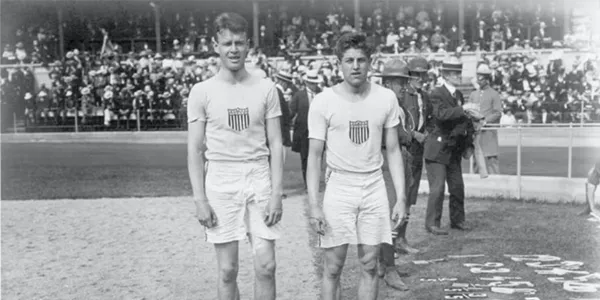1. At the 5th Olympic Games in Stockholm, an unusual rule allowed athletes to false start as often as they wanted. Which American sprinter used this to his advantage by making three false starts, disorienting his opponent and winning the 100m title?

American sprinter Ralph Craig used multiple false starts to win the 100m title at the 1912 Stockholm Olympics, though he only made three false starts, not eight, and ran the full distance on one of them to disorient his competitor. At that time, unlike today's one-strike rule, the rule did not automatically disqualify a sprinter for a single false start, allowing for this tactic.
What Olympic Oddities and Myths Do You Know?🏅
The Olympics are more than just medals and glory; they're a treasure trove of oddities, myths, and stories that make us laugh, puzzle, and even marvel. From marathon runners who overslept to fencers possessing "Excalibur," the Olympics are filled with bizarre twists and turns. This article will uncover the most bizarre Olympic legends and see how much you know about the wilder aspects of Olympic history!
The Olympics are the world's greatest sporting event. For athletes, they are the culmination of years of hard work, sacrifice, and unwavering determination. For spectators, they combine awe-inspiring athleticism with stirring national pride. However, behind the medals and world records lies a lesser-known side: the bizarre, hilarious, and sometimes unbelievable anomalies of Olympic history.
Marathon Accidents and the Long Road
One of the most famous oddities is the 54-year marathon run of Shizo Kanakuri. In 1912, while competing in Stockholm, he stopped to eat, drink, and rest at a villager's house. Embarrassed, he quietly returned home without finishing the race. Decades later, at the age of 76, he was invited back to "complete" the marathon! It was the slowest marathon in history, but perhaps also the most heartwarming.
Marathons always seem fraught with drama. Runners have stumbled, been misled onto the wrong route, or been slowed by extreme heat and sandstorms. Yet, each incident adds to the legendary legacy of endurance races.
"Magic" Equipment
Olympic history is rife with scandals. At the 1976 Montreal Olympics, Soviet fencer Boris Onishchenko gained notoriety for installing a hidden button on his epee. With a single press, he could "hit" his opponent without even touching him! The referee discovered his ruse, disqualified him, and branded him a cheater for life.
Even earlier, in 1912, an American sprinter used eight false starts to disrupt his opponent. Since there were no penalty rules at the time, he simply false-started again and again until the race became tense and unsustainable. It was a real psychological battle!
Bizarre Behavior
Sometimes, the Olympics have descended into chaos. At the 2008 Beijing Olympics, a Tajikistani boxer bit his opponent's shoulder mid-match, leaving a noticeable wound. Unsurprisingly, he was disqualified. Fans joked that he drew inspiration from Mike Tyson.
Meanwhile, at the 1988 Seoul Olympics, a boxing match devolved into a wrestling melee. After a popular Korean fighter was defeated, the coach and referee rushed into the ring and attacked the referee. Chaos ensued, chairs flew everywhere, and the match culminated in one of the wildest riots in Olympic history.
Twin Identity Swaps
The Olympics have also seen some bizarre identity swaps. At the 1984 Los Angeles Olympics, the Puerto Rican women's 4x400m relay team was in trouble after an injury to a runner. Her identical twin sister wasn't a full-time athlete, but she stepped up and helped them qualify! When the referees discovered the identity swap, the team had to withdraw from the competition.
Bizarre Traditions
Sometimes, quirkiness stems not from cheating, but from humor. Canadian swimmer Santo Cordelli and his father share a ritual: before each race, they give each other the middle finger as a sign of "good luck." While it may seem rude to spectators, it's actually a private gesture of encouragement.
Elsewhere, athletes celebrate in all sorts of bizarre ways, from victory cartwheels to unexpected mid-race marriage proposals. The Olympics are serious, but joy often comes in subtle ways.
Myths and Misconceptions
Besides genuine anecdotes, myths abound surrounding the Olympics. Some believe the gold medals are pure gold (they're not; they're mostly silver). Others firmly believe the Olympic flame has been burning continuously since ancient Greece (in reality, it's relit every four years).
Even if these myths aren't entirely true, they add to the magic of the Olympics. After all, the Olympics are more than just a sport; they're about storytelling.
From marathon naps to Excalibur, from nail-biting boxers to nimble pole vaulters, Olympic history is filled with stories that blur the line between triumph and comedy. These anecdotes remind us that even on the world's biggest stage, humanity shines through in all its strange forms. Are you ready to test your knowledge? Take our "Olympic Anecdotes and Myths" quiz below to find out if you're just an average Olympics enthusiast or a true Olympic secret keeper!
